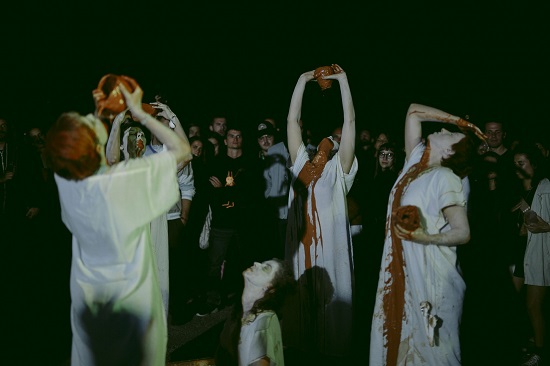Gazelle Twin photo by Marcelo Baptista
This is as adventurous as a festival gets: a brilliantly bewildering mix of electronica, metal, jazz, funk, pop, rock, performance art and experimentation where the performers are all united by a common intent to push the boundaries of what music can achieve. They present new ideas in their purest form – abstract, confrontational and un-watered down. Unlike most festivals, there is no need for gimmicks to supplement the programming – there’s no rollercoasters, overpriced food halls or roller discos to keep the casuals entertained. There is no need for it.
Gazelle Twin plays the Palco Lovers stage, dressed as the ‘modern folk devil’ that fronts her stunning new Pastoral album. Wearing all red and white, in a Puma windbreaker, leggings, football socks, Adidas trainers and a baseball cap, red ribbons dangling from her elbows, we are presented with a modernised and nightmarish medieval jester. Lurching and leaping in the colours of the St George’s Cross, her face is masked save for a mouth that grins with a leering, discomforting evil as she stares straight into the whites of her audience’s eyes. Behind her, a DJ veiled by his hoodie spins horrid, crunching beats, spinning, whirling and distorting her grim proclamations to heights that are more fearsome still.
What puts this performance apart from the host of other captivating gigs at Milhões de Festa is its totality. Gazelle Twin stays completely in character from beginning to end – there are no thank-yous or interactions with the crowd unless you count leaning in close to an audience member with a menacing snarl. She channels a multitude of voices, from the older disconnected generation’s “better in my day” lyric to the frustrated younger brexiteers’ anti-immigration rhetoric to the blinkered opinions of liberals in denial. It is interesting that this nightmarish reflection of a divided British society on the brink of collapse translates so well in a festival on the banks of a river, nestled in a picturesque Portuguese town.
The audience are gripped, unsure if it’s appropriate to applaud or take photos. When she departs before a brief encore the cheers are muted. Instead there’s a sharp intake of breath, murmurs of amazement and a lot of shocked, bleary expressions. With this Pastoral project, Gazelle Twin draws on the current British experience to present a global picture of the bleak situation we find ourselves in.
Echoing Milhões de Festa as a whole, Gazelle Twin’s polished, direct simplicity is her greatest strength. This show relies on the power of Gazelle Twin’s conceptual vision, and the muscle and complexity of her music: she turns a tracksuit, beats and chanting into something singularly sinister. It is easily the most haunting performance of the festival, if not the summer.
Not that the standards haven’t already been set supremely high. Moor Mother and DJ Haram, performing together as 700 Bliss, are the first to truly ignite the festival with their Thursday night set. They demand that their crowd, until then hanging back and reluctant to fully engage, stand as close as possible to them at the barrier. Before long they’re not just hooked, but blown away by a barrage of beats by DJ Haram, Moor Mother hyping us into an inferno. 700 Bliss set a confident standard that Milhões de Festa will be uncompromising, confrontational and intense. The set builds from their more instrumental work into something much more aggressive: “They drop a bomb right here / Suicide bomb over there / They’re shooting down right here / And y’all won’t care,” Moor Mother spits on ‘Scully’ as DJ Haram shoots the sound of gunfire from her decks. It sets the tone for the weekend: nothing here will be basic. There is no acoustic stage.

BodyVice photo by Rafael Farias
Take Natalie Sharp’s BodyVice performance at the Palco Piscina. She and her two supporting musicians (wearable synth producer Phantom Chips and flautist/visual artist Tida Bradshaw) can be seen ambling around the swimming pool among the sunbathing revellers on Saturday afternoon, their faces painted in brilliant International Blue. When it’s time for their set, they appear alien-like, covered in spiralling elastic circles – Sharp’s are flesh-coloured, the others in that same Yves Klein blue. It begins as a mess of clashing noises at a searingly loud volume, shrill screeches, distorted feedback and pulsing rhythm, before a heavy beat slowly emerges from the chaos. The three are constantly in motion. At one point they work out on the floor in sync like an 80s Jane Fonda tape, at another they dash their way among the crowd hoisting gigantic, circular mirrors, all the while soundtracked by the shuddering, screaming noise they concoct with flute, electronics, wearable synth pads and their bodies.
The stage, perched on the end of a swimming pool, is in the midst of the most lazy, luxurious scene it’s possible to see at a music festival, and it’s pleasing to see a crowd so eager to take a break from their swimming and sunbathing to engage fully with radical art.
The pool is where the majority of attendees spend the daylight hours, but it’s the small Palco Taina courtyard that is the festival’s true hub. Porto record label Favela Discos take over the stage on Thursday night for our first taste, Os Amigos de Anta, who hoot and howl their way among the crowd, dressed like a cross between a Russian babushka and Spirited Away’s No-Face. It’s a baffling but beautiful scene, the courtyard pocked with benches under the shade of orange trees, a DIY bar selling sangria against the walls of the weathered old Iberian house that flanks the stage.
On Milhões de Festa’s fourth and final day, Manchester collective Fat Out stage a takeover of their own at the Taina, with Croww, GSYP!A, Hajahh and Marilyn Misandry playing a cavalcade of radical noise – at times ear-splittingly harsh and at others affecting in their power. For Misandry’s spoken-word set, yellow and black fabric is tied in an off-kilter web around the posts of the stage as she delivers a dark, hostile monologue on her experiences as a trans woman. She speaks of her public labelling of ‘monster’ and how she takes ownership of the word. She performs at first in the nude, adding a robe and gaudy makeup as she goes; her words are shocking and ultimately touching. She is easily the most powerful of the bunch.
To close, all the evening’s Fat Out performers and other associates make up the ‘Queen Bee Supergroup’ for a final, berserk show. The band, which also contains Natalie Sharp, Deyar Yasin, Phantom Chips, Tida Bradshaw and others, offer a chaotic, improvised clash of pummeling drums, power electronics, screaming and distortion, performed at searing volume as minions writhe their way among the fabric, throwing glitter at the crowd with impish abandon. Though the final act does feel a little exclusive for those not already a part of the Fat Out collective, within Milhões de Festa their takeover is its own pocket of extremity.

UKAEA photo by Renato Cruz Santos
Diversity is one of this festival’s great strengths. It is a festival where Belgian up-and-comer WWWater – whose set is a glorious blend of hazy pop and electronics interspersed with manic vocal stampedes – can rub shoulders with Circle, the longstanding Finnish pioneers of batshit crazy prog-glam-kraut-metal brilliance. At the Palco Lovers, meanwhile, Portuguese disco/rock legend Lena d’Água, cited as the spark for the country’s so-called ‘rock boom’ of the 80s, performs alongside contemporary star Manuel Lourenço, aka Primeira Dama (First Lady), trading songs from their both of their brilliant careers.
Between its two takeovers Palco Taina also hosts some of the festivals finest one-off gigs – Portuguese riot punks Decibelicas among the finest – but it’s at the two main stages that Milhões de Festa ends with a beautiful bang. After the Fat Out crew’s brainmangling, The Heliocentrics’ psychedelic jazz is a welcome, soothing trip back out to the cosmos. Mouse On Mars follow on the Palco Lovers with a frenetic, genre-jumping set of rushing electronics – the weekend’s last, glorious rave.
UKAEA ends the entirety of the festival with a druidic ritual, performed partly in the middle of the crowd, an appropriately esoteric conclusion to a special festival that eschews gimmicks and pre-packaged ‘festival vibes’ to present music as art in its purest form, regardless of its genre. Milhões de Festa is for performers whose work feeds our wider popular culture, whose radical explorations are watered down or smoothed over for mass consumption. For that, it is absolutely essential.


